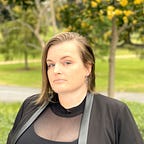A Tale of Overcoming Great Odds
When I was younger, being a chubby, bisexual goth girl was a sort of stereotype of udder ridiculousness. I never felt much of a stereotype of anything, so I tried to loosen this image from myself. I tried first by getting a wardrobe of in-fashion clothes for my first year of high school. Unfortunately, my sense of what was fashionable betrayed my abnormal mind and it didn’t work at all — I ended up still sticking out. Then, I tried pretending I wasn’t bisexual. That didn’t go so well for me as I just closeted myself instead. To be honest, I never tried hard not to be goth; I actually tried so hard that I almost became a completely irrevocable asshole — more on that on my recent blog, “You, Me, and Metalcore.” I don’t think I ever really thought of myself as a “girl,” but there weren’t words for my identity back then. Being chubby was something I violently tried to change many times to no avail. So, I eventually had to accept that I was utterly ridiculous and move on.
When a story I wrote was accepted for a print anthology in 2021, I was tasked with writing a complex biography to include with my work. And, seriously, I had no idea how to not look ridiculous on paper. “Hi, I’m an overweight queer, neurodiverse person who dressed like Nosferatu for the better part of my adult years.” I sound like an edgelord. Of course, I had reasons for everything I was, but that didn’t matter at all on a surface level. Overweight: eating disorder brought on by pretty intense abuse and neglect coupled with at least two known autoimmune disorders (here is a peer-reviewed article about autoimmune disorders and PTSD). Queer: yeah, that’s pretty self-explanatory, I was born that way. Neurodiverse: I am genetically linked to no less than 3 others in my blood relations who have ADHD and/or ASD and I’ve been diagnosed as such. Being spooky: Well, that’s a little trickier. If you mixed Johnny Cash’s “Man in Black” with a love of horror movies and Sandman, you can sort of see why I came out the way I did. These things about me aren’t up for contestation, no matter how ridiculous I come off. But, still, I tried frequently not to be a walking joke. I reread my “author bio” for that piece after it published and I said to myself: WOW — I feel like a caricature of a person.
I like to think of my successes as especially remarkable due to the limitations placed upon people of any one of my identities: queer, neurodiverse, survivor, not to mention all. And when I began my path into writing, I told many stories about overcoming great odds. I truly felt proud of how far I’d come in spite of these complications. Then it happened that I received praise for speaking about my experiences with domestic violence, which is both good and bad. Good because I was joining a very important conversation on the ubiquitous experience of domestic violence; bad because I quickly learned that publishing loves to exploit one’s trauma. In response to this, I wrote more about my trauma. My intentions were, again, bad and good. Bad because I wanted my writing to garner more attention; good because the issue truly needs attention. However, in so doing, I completely neglected many aspects of who I am. I distilled my experience to that of a survivor alone.
Here in my blog, I’ve tried to desperately grapple with my intersectional identities. As a Non-Binary person, I wrote “The Feminine Non-Binary” and others As a survivor, I wrote “I Know What He Said,” and as a neurodiverse person, I wrote “Neurodiverse Me.” I also work heavily on topics of feminist critical theory and mental health. I am a little ashamed to admit that I rarely talk about my queer identity — probably internalized biphobia. I often wonder if my personal essays here are a little too eclectic to connect with a larger audience. A person who likes my survivor stuff might be turned off by my Non-Binary stuff. A person who likes my feminist topics might be turned off by my mental health/neurodiversity conversations. But, as described above, I cannot choose my identities. It reminds me of someone once close to my partner once saying: “You married a man, you’re not bisexual anymore.” That’s patently untrue (plus, my partner is AMAB — not that the distinction meant anything to them). I can’t be just a survivor, just a feminist, just one thing. I once wanted to stop being so ridiculously complex in my edgy identities, but that never worked out. Now my greatest challenge to overcome is being taken seriously without sacrificing any part of who I am.
